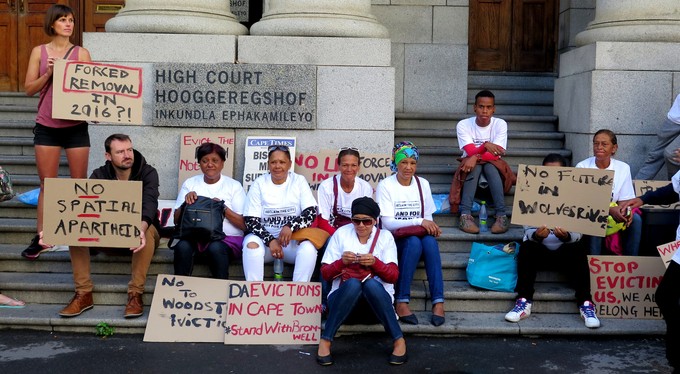
The residents of Bromwell Street in Woodstock are contesting their eviction. Photo: Ashleigh Furlong
9 November 2016
The Bromwell Street families from Woodstock, who face eviction, have been ordered to apply for social housing before returning to court in January.
The nine Bromwell Street families had taken their eviction to the High Court, in an attempt to compel the City of Cape Town to provide them with emergency housing near Woodstock. Today they applied for a postponement of their case.
The families face eviction from their homes in Bromwell Street by the Woodstock Hub, the developer that owns their homes. Aided by activist group Reclaim the City, the residents have campaigned against their eviction. Most recently, the City has proposed that the residents move to Wolwerivier, a desolate settlement 25km from Cape Town.
The postponement in the matter today is to allow time for the families to find out whether they qualify for housing subsidies. This may reduce the number of families who need emergency housing provided by the City.
Advocate Sheldon Magardie, on behalf of the Bromwell Street residents, told the court that eight of the nine families had already applied for housing from social housing institution Communicare. He said that if the alternative accommodation, such as that provided by Communicare, was “suitable and available”, those applicants who qualified wouldn’t continue with their application for emergency housing. Alternative accommodation did not have to be in Woodstock, he said.
Acting Judge Leslie Weinkove said that he was “alive to the unfortunate situation” of the Bromwell Street residents and he was “appreciative” of the municipality “bending over backward to accommodate this crisis”.
He said that he would be available anytime to deal with the matter.
The Woodstock Hub opposed the postponement, arguing that some families would anyway not qualify for alternative accommodation.
Advocate Ross Randell on behalf of the Woodstock Hub, voiced concern over long delays if the matter was postponed.
In response, Weinkove said that he would be available to make interim orders before the court date.
“I am alive to the fact that this undertaking was purchased with borrowed money and is costing [the Woodstock Hub] a fortune,” said Weinkove. But he pointed out that the constitution did to an extent protect people such as the Bromwell Street families who face homelessness.
Weinkove said that he wanted to see a South Africa where people received basic housing.
“It’s shocking what happening in this country,” said Weinkove, “with people sleeping under bridges.”
Weinkove asked Randell whether he wanted the sheriff to arrest the families and put them under a bridge.
Randell requested that the applicants cover the costs of the postponement, to which Weinkove responded that “these are not rich people”. In the order agreed upon, which was proposed by Advocate Karrisha Pillay, acting for the City, it was decided that costs would stand over until a “later determination”.
Weinkove ordered that the residents must apply to all social housing institutions in Cape Town and that they must “cooperate fully with these entities”. They must also provide regular updates before they appear in court again on 30 January 2017.
Graham Beukes, one of the applicants, said he was relieved about the decision. “Now we can spend Christmas in Woodstock,” said Beukes. But, he said, he was concerned about what would happen to families who did not qualify for subsidised housing.